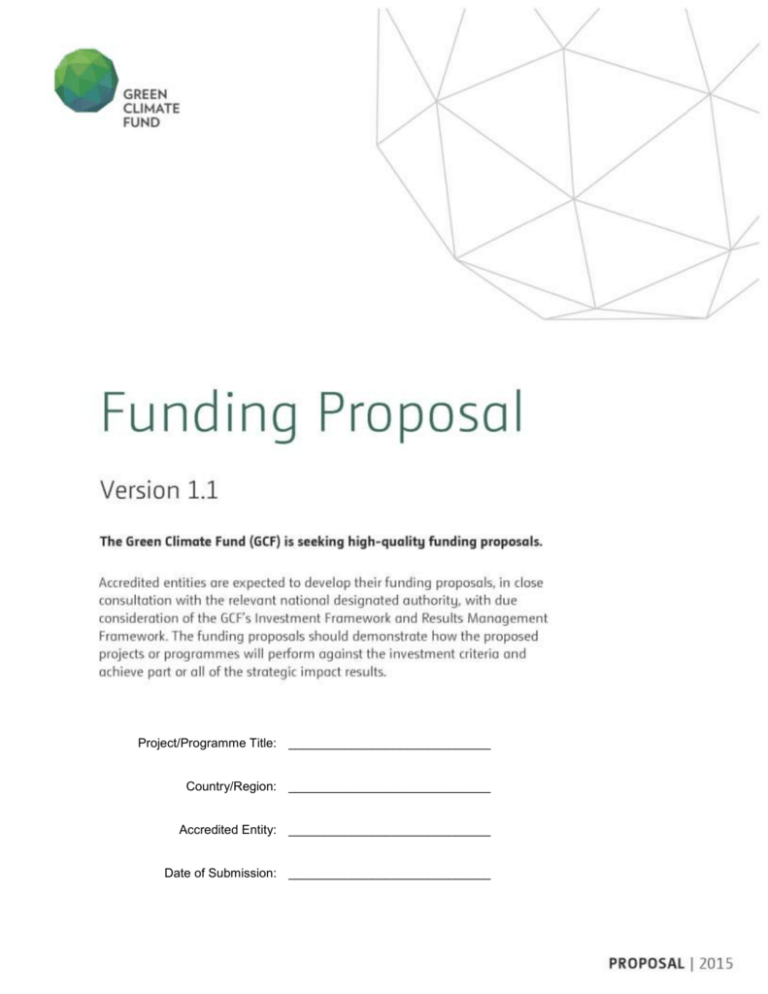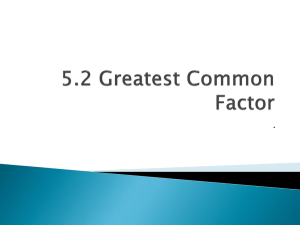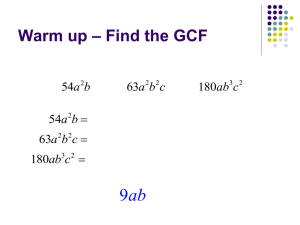Funding Proposal Template ver.1.1 (clean copy)
advertisement

Project/Programme Title: _____________________________ Country/Region: _____________________________ Accredited Entity: _____________________________ Date of Submission: _____________________________ Contents Section A PROJECT / PROGRAMME SUMMARY Section B FINANCING / COST INFORMATION Section C DETAILED PROJECT / PROGRAMME DESCRIPTION Section D RATIONALE FOR GCF INVOLVEMENT Section E EXPECTED PERFORMANCE AGAINST INVESTMENT CRITERIA Section F APPRAISAL SUMMARY Section G RISK ASSESSMENT AND MANAGEMENT Section H RESULTS MONITORING AND REPORTING Section I ANNEXES Note to accredited entities on the use of the funding proposal template Sections A, B, D, E and H of the funding proposal require detailed inputs from the accredited entity. For all other sections, including the Appraisal Summary in section F, accredited entities have discretion in how they wish to present the information. Accredited entities can either directly incorporate information into this proposal, or provide summary information in the proposal with cross-reference to other project documents such as project appraisal document. The total number of pages for the funding proposal (excluding annexes) is expected not to exceed 50. Please submit the completed form to: fundingproposal@gcfund.org Please use the following name convention for the file name: “[FP]-[Agency Short Name]-[Date]-[Serial Number]” PROJECT / PROGRAMME SUMMARY GREEN CLIMATE FUND FUNDING PROPOSAL | PAGE 1 OF 20 A A.1. Brief Project / Programme Information A.1.1. Project / programme title A.1.2. Project or programme Choose an item. A.1.3. Country (ies) / region A.1.4. National designated authority (ies) A.1.5. Accredited entity A.1.5.a. Access modality ☐ Direct A.1.6. Executing entity / beneficiary Executing Entity: Beneficiary: A.1.7. Project size category (Total investment, million USD) A.1.8. Mitigation / adaptation focus ☐ International ☐ Micro (≤10) ☐ Small (10<x≤50) ☐ Medium (50<x≤250) ☐ Large (>250) ☐ Mitigation ☐ Adaptation ☐ Cross-cutting A.1.9. Date of submission Contact person, position A.1.10. Project contact details Organization Email address Telephone number Mailing address A.1.11. Results areas (mark all that apply) Reduced emissions from: ☐ Energy access and power generation ☐ Low emission transport ☐ Buildings, cities and industries and appliances ☐ Forestry and land use (E.g. on-grid, micro-grid or off-grid solar, wind, geothermal, etc.) (E.g. high-speed rail, rapid bus system, etc.) (E.g. new and retrofitted energy-efficient buildings, energy-efficient equipment for companies and supply chain management, etc.) (E.g. forest conservation and management, agroforestry, agricultural irrigation, water treatment and management, etc.) Increased resilience of: Most vulnerable people and communities (E.g. mitigation of operational risk associated with climate change – diversification of supply sources and supply chain management, ☐ relocation of manufacturing facilities and warehouses, etc.) ☐ Health and well-being, and food and water security ☐ Infrastructure and built environment ☐ Ecosystem and ecosystem services (E.g. climate-resilient crops, efficient irrigation systems, etc.) (E.g. sea walls, resilient road networks, etc.) (E.g. ecosystem conservation and management, ecotourism, etc.) PROJECT / PROGRAMME SUMMARY GREEN CLIMATE FUND FUNDING PROPOSAL | PAGE 2 OF 20 A A.2. Project / Programme Executive Summary (max 300 words) Please provide a brief description of the proposed project/programme, including the objectives and primary measurable benefits (see investment criteria in section E). The detailed description can be elaborated in section C. A.3. Project/Programme Milestone Expected approval from accredited entity’s Board (if applicable) dd/mm/yyyy Expected financial close (if applicable) dd/mm/yyyy Estimated implementation start and end date Start: dd/mm/yyyy End: dd/mm/yyyy Project/programme lifespan ______ years ______ months FINANCING / COST INFORMATION GREEN CLIMATE FUND FUNDING PROPOSAL | PAGE 3 OF 20 B B.1. Description of Financial Elements of the Project / Programme Please provide: an integrated financial model in Section I (Annexes) that includes a projection covering the period from financial closing through final maturity of the proposed GCF financing with detailed assumptions and rationale; and a sensitivity analysis of critical elements of the project/programme a description of how the choice of financial instrument(s) will overcome barriers and achieve project objectives, and leverage public and/or private finance a breakdown of cost estimates for total project costs and GCF financing by sub-component in local and foreign currency and a currency hedging mechanism: For example, under the component of drilling activity for a geothermal exploration project, sub-components would include civil engineering works, drilling services, drilling equipment and inspection test. Component Subcomponent (if applicable) Amount (for entire project) Currency Amount (for entire project) Component 1 Subcomponent 1.1 …………. Options …………. …………. Subcomponent 1.2 …………. Options …………. …………. Subcomponent 2.1 …………. Options …………. …………. Component 2 Local currency GCF funding amount Currency of disbursement to recipient Total project financing * Please expand the table if needed. a breakdown of cost/budget by expenditure type (project staff and consultants, travel, goods, works, services, etc.) and disbursement schedule in project/programme confirmation (term sheet) as included in section I, Annexes. B.2. Project Financing Information (a) Total project financing Financial Instrument Amount Currency (a) = (b) + (c) ………………… Options (i) Senior Loans (b) GCF financing to recipient Tenor Pricing ………………… (ii) Subordinated Loans Options ( ) years ( )% ………………… Options ( ) years ( )% (iii) Equity ………………… Options (iv) Guarantees ………………… Options ………………… Options ………………… Options (v) Reimbursable grants * (vi) Grants * ( ) % IRR FINANCING / COST INFORMATION GREEN CLIMATE FUND FUNDING PROPOSAL | PAGE 4 OF 20 B * Please provide economic and financial justification in section F.1 for the concessionality that GCF is expected to provide, particularly in the case of grants. Please specify difference in tenor and price between GCF financing and that of accredited entities. Please note that the level of concessionality should correspond to the level of the project/programme’s expected performance against the investment criteria indicated in section E. Total requested (i+ii+iii+iv+v+vi) (c) Cofinancing to recipient ………………… Options Financial Instrument Amount Currency Name of Institution Options …………… Options ……………… Options …………… Options ……………… Options …………… Options ……………… Options …………… Options ……………… Tenor Pricing ( ) years ( ) years Seniority ( )% Options ( )% Options ( ) % IRR Options Options Lead financing institution: ……………………… * Please provide a confirmation letter or a letter of commitment in section I issued by the co-financing institution. In cases where the accredited entity (AE) deploys the GCF financing directly to the recipient, (i.e. the GCF financing passes directly from the GCF to the recipient through the AE) or if the AE is the recipient itself, in the proposed financial instrument and terms as described in part (b), this subsection can be skipped. (d) Financial terms between GCF and AE (if applicable) If there is a financial arrangement between the GCF and the AE, which entails a financial instrument and/or financial terms separate from the ones described in part (b), please fill out the table below to specify the proposed instrument and terms between the GCF and the AE. Financial instrument Amount Currency Tenor Pricing Choose an item. …………………. Options ( ) years ( )% Please provide a justification for the difference in the financial instrument and/or terms between what is provided by the AE to the recipient and what is requested from the GCF to the AE. B.3. Financial Markets Overview (if applicable) How market price or expected commercial rate return was (non-concessional) determined? Please provide an overview of the size of total banking assets, debt capital markets and equity capital markets which could be tapped to finance the proposed project/programme. Please provide an overview of market rates (i.e. 1-year T-Bill, 5-year government bond, 5-year corporate bond (specify credit rating) and 5-year syndicate loan. Provide examples or information on comparable transactions. DETAILED PROJECT / PROGRAMME DESCRIPTION GREEN CLIMATE FUND FUNDING PROPOSAL | PAGE 5 OF 20 C Please fill out applicable sub-sections and provide additional information if necessary, as these requirements may vary depending on the nature of the project / programme. C.1. Strategic Context Please describe relevant national, sub-national, regional, global, political, and/or economic factors that help to contextualize the proposal, including existing national and sector policies and strategies. C.2. Project / Programme Objective against Baseline Describe the baseline scenario (i.e. emissions baseline, climate vulnerability baseline, key barriers, challenges and/or policies) and the outcomes and the impact that the project/programme will aim to achieve in improving the baseline scenario. C.3. Project / Programme Description Describe the main activities and the planned measures of the project/programme according to each of its components. Provide information on how the activities are linked to objectives, outputs and outcomes that the project/programme intends to achieve. The objectives, outputs and outcomes should be consistent with the information reported in the logic framework in section H. C.4. Background Information on Project / Programme Sponsor (Executing Entity) Describe the quality of the management team, overall strategy and financial profile of the Sponsor (Executing Entity) and how it will support the project/programme in terms of equity investment, management, operations, production and marketing. DETAILED PROJECT / PROGRAMME DESCRIPTION GREEN CLIMATE FUND FUNDING PROPOSAL | PAGE 6 OF 20 C C.5. Market Overview (if applicable) Describe the market for the product(s) or services including the historical data and forecasts. Describe the competitive environment including the list of competitors with market shares and customer base and key differentiating factors (if applicable). Provide pricing structures, price controls, subsidies available and government involvement (if any). C.6. Regulation, Taxation and Insurance (if applicable) Provide details of government licenses or permits required for implementing and operating the project/programme, the issuing authority, and the date of issue or expected date of issue. Describe applicable taxes and foreign exchange regulations. Provide details on insurance policies related to project/programme. C.7. Institutional / Implementation Arrangements Please describe in detail the governance structure of the project/programme, including but not limited to the organization structure, roles and responsibilities of the project/programme management unit, steering committee, executing entities and so on, as well as the flow of funds structure. Also describe which of these structures are already in place and which are still pending. For the pending ones, please specify the requirements to establish them. Describe construction and supervision methodology with key contractual agreements. Describe operational arrangements with key contractual agreements following the completion of construction. If applicable, provide the credit analysis of key counterparties of key contractual agreements and/or structural mitigants to cover the counterparty risks. DETAILED PROJECT / PROGRAMME DESCRIPTION GREEN CLIMATE FUND FUNDING PROPOSAL | PAGE 7 OF 20 C.8. Timetable of Project/Programme Implementation Please provide a project/programme implementation timetable in section I (Annexes). The table below is for illustrative purposes. If the table format below is used, please refer to the activities as numbered in Section H. In the case of outputs, please mark when all the required activities will be completed. T ASK Q1 Q2 X X Q3 Q4 Q5 Q6 Q7 X X X X X X X X Q8 Q9 Q10 Q11 Q12 Q13 Q14 X X X X Output 1. Activity 1.1. Activity 1.2. Activity 1.3. … Output 2. Activity 2.1. Activity 2.2. Activity 2.3. X X X X X X X X X X X X Q15 Q16 Q17 Q18 Q19 Q20 Q21 Q22 Q23 Q24 C RATIONALE FOR GCF INVOLVEMENT GREEN CLIMATE FUND FUNDING PROPOSAL | PAGE 8 OF 20 D D.1. Value Added for GCF Involvement Please specify why the GCF involvement is critical for the project/programme, in consideration of other alternatives. D.2. Exit Strategy Please explain how the project/programme sustainability will be ensured in the long run, after the project/programme is implemented with support from the GCF and other sources, taking into consideration the long-term financial viability demonstrated in E.6.3. This should include a description of strategies for longer term maintenance of physical assets (if applicable). EXPECTED PERFORMANCE AGAINST INVESTMENT CRITERIA GREEN CLIMATE FUND FUNDING PROPOSAL | PAGE 9 OF 20 E In this section, the accredited entity is expected to provide a brief description of the expected performance of the proposed project/programme against each of the Fund’s six investment criteria. Activity-specific sub-criteria and indicative assessment factors, which can be found in the Fund’s Investment Framework, should be addressed where relevant and applicable. This section should tie into any request for concessionality made in section B.2. E.1. Impact Potential Potential of the project/programme to contribute to the achievement of the Fund’s objectives and result areas E.1.1. Mitigation / adaptation impact potential Specify the mitigation and/or adaptation impact, taking into account the relevant and applicable sub-criteria and assessment factors in the Fund’s investment framework. When applicable, specify the degree to which the project/programme avoids lock-in of long-lived, high emission or climate-vulnerable infrastructure. E.1.2. Key impact potential indicator Provide specific numerical values for the indicators below. Expected tonnes of carbon dioxide equivalent (t CO2 eq) to be reduced or avoided (Mitigation only) GCF core indicators Other relevant indicators Expected total number of direct and indirect beneficiaries, disaggregated by gender (reduced vulnerability or increased resilience); Number of beneficiaries relative to total population, disaggregated by gender (adaptation only) Annual Lifetime Total Percentage (%) Examples include: Expected increase in the number of households with access to low-emission energy Expected increase in the number of small, medium and large low-emission power suppliers, and installed effective capacity Expected increase in generation and use of climate information in decision-making Expected strengthening of adaptive capacity and reduced exposure to climate risks Others Describe the detailed methodology used for calculating the indicators above. Describe how the project/programme’s indicator values compare to the appropriate benchmarks (i.e. the indicator values for a similar project/programme in a comparable context). EXPECTED PERFORMANCE AGAINST INVESTMENT CRITERIA GREEN CLIMATE FUND FUNDING PROPOSAL | PAGE 10 OF 20 E E.2. Paradigm Shift Potential Degree to which the proposed activity can catalyze impact beyond a one-off project/programme investment E.2.1. Potential for scaling up and replication (Provide a numerical multiple and supporting rationale) Describe how the proposed project/programme’s expected contributions to global low-carbon and/or climate-resilient development pathways could be scaled-up and replicated including a description of the steps necessary to accomplish it. E.2.2. Potential for knowledge and learning Describe how the project/programme contributes to the creation or strengthening of knowledge, collective learning processes, or institutions. E.2.3. Contribution to the creation of an enabling environment Describe how proposed measures will create conditions that are conducive to effective and sustained participation of private and public sector actors in low-carbon and/or resilient development that go beyond the program. . Describe how the proposal contributes to innovation, market development and transformation. Examples include: Introducing and demonstrating a new market or a new technology in a country or a region Using innovative funding scheme such as initial public offerings and/or bond markets for projects/programme E.2.4. Contribution to regulatory framework and policies Describe how the project/programme strengthens the national / local regulatory or legal frameworks to systematically drive investment in low-emission technologies or activities, promote development of additional low-emission policies, and/or improve climate-responsive planning and development. EXPECTED PERFORMANCE AGAINST INVESTMENT CRITERIA GREEN CLIMATE FUND FUNDING PROPOSAL | PAGE 11 OF 20 E E.3. Sustainable Development Potential Wider benefits and priorities E.3.1. Environmental, social and economic co-benefits, including gender-sensitive development impact E.4. Needs of the Recipient Vulnerability and financing needs of the beneficiary country and population E.4.1. Vulnerability of country and beneficiary groups (Adaptation only) Describe the scale and intensity of vulnerability of the country and beneficiary groups, and elaborate how the project/programme addresses the issue (e.g. the level of exposure to climate risks for beneficiary country and groups, overall income level, etc). E.4.2. Financial, economic, social and institutional needs Describe how the project/programme addresses the following needs: Economic and social development level of the country and the affected population Absence of alternative sources of financing (e.g. fiscal or balance of payment gap that prevents from addressing the needs of the country; and lack of depth and history in the local capital market) Need for strengthening institutions and implementation capacity. E.5. Country Ownership Beneficiary country (ies) ownership of, and capacity to implement, a funded project or programme E.5.1. Existence of a national climate strategy and coherence with existing plans and policies, including NAMAs, NAPAs and NAPs Please describe how the project/programme contributes to country’s identified priorities for low-emission and climateresilient development, and the degree to which the activity is supported by a country’s enabling policy and institutional framework, or includes policy or institutional changes. EXPECTED PERFORMANCE AGAINST INVESTMENT CRITERIA GREEN CLIMATE FUND FUNDING PROPOSAL | PAGE 12 OF 20 E E.5.2. Capacity of accredited entities and executing entities to deliver Please describe experience and track record of the accredited entity and executing entities with respect to the activities that they are expected to undertake in the proposed project/programme. E.5.3. Engagement with NDAs, civil society organizations and other relevant stakeholders Please provide a full description of the steps taken to ensure country ownership, including the engagement with NDAs on the funding proposal and the no-objection letter. Please also specify the multi-stakeholder engagement plan and the consultations that were conducted when this proposal was developed. E.6. Efficiency and Effectiveness Economic and, if appropriate, financial soundness of the project/programme E.6.1. Cost-effectiveness and efficiency Describe how the financial structure is adequate and reasonable in order to achieve the proposal’s objectives, including addressing existing bottlenecks and/or barriers; providing the least concessionality; and without crowding out private and other public investment. Please describe the efficiency and effectiveness, taking into account the total project financing and the mitigation/ adaptation impact that the project/programme aims to achieve, and explain how this compares to an appropriate benchmark. For mitigation, please make a reference to E.6.5 (core indicator for the cost per tCO2eq). EXPECTED PERFORMANCE AGAINST INVESTMENT CRITERIA GREEN CLIMATE FUND FUNDING PROPOSAL | PAGE 13 OF 20 E E.6.2. Co-financing, leveraging and mobilized long-term investments (mitigation only) Please provide the co-financing ratio (total amount of co-financing divided by the Fund’s investment in the project/programme) and/or the potential to catalyze indirect/long-term low emission investment. Please make a reference to E.6.5 (core indicator for the expected volume of finance to be leveraged). E.6.3. Financial viability Please specify the expected economic and financial rate of return with and without the Fund’s support, based on the analysis conducted in F.1. Please describe financial viability in the long run beyond the Fund intervention. Please describe the GCF’s financial exit strategy in case of private sector operations (e.g. IPOs, trade sales, etc.). E.6.4. Application of best practices Please explain how best available technologies and practices are considered and applied. If applicable, specify the innovations/modifications/adjustments that are made based on industry best practices. EXPECTED PERFORMANCE AGAINST INVESTMENT CRITERIA GREEN CLIMATE FUND FUNDING PROPOSAL | PAGE 14 OF 20 E E.6.5. Key efficiency and effectiveness indicators Estimated cost per t CO2 eq, defined as total investment cost / expected lifetime emission reductions (mitigation only) (a) Total project financing US$_______ (b) Requested GCF amount US$_______ (c) Expected lifetime emission reductions overtime _______ tCO2eq (d) Estimated cost per tCO2eq (d = a / c) US$_______ / tCO2eq (e) Estimated GCF cost per tCO2eq removed (e = b / c) US$_______ / tCO2eq Describe the detailed methodology used for calculating the indicators (d) and (e) above. Please describe how the indicator values compare to the appropriate benchmarks established in a comparable context. GCF core indicators Expected volume of finance to be leveraged by the proposed project/programme and as a result of the Fund’s financing, disaggregated by public and private sources (mitigation only) Describe the detailed methodology used for calculating the indicators above. Please describe how the indicator values compare to the appropriate benchmarks established in a comparable context. Other relevant indicators (e.g. estimated cost per co-benefit generated as a result of the project/programme) APPRAISAL SUMMARY GREEN CLIMATE FUND FUNDING PROPOSAL | PAGE 15 OF 20 F * The information can be drawn from the project/programme appraisal document. F.1. Economic and Financial Analysis Please provide the narrative and rationale for the detailed economic and financial analysis (including the financial model, taking into consideration the information provided in section E.6.3). Based on the above analysis, please provide economic and financial justification (both qualitative and quantitative) for the concessionality that GCF provides, with a reference to the financial structure proposed in section B.2. F.2. Technical Evaluation Please provide an assessment from the technical perspective. If a particular technological solution has been chosen, describe why it is the most appropriate for this project/programme. F.3. Environmental, Social Assessment, including Gender Considerations Describe the main outcome of the environment and social impact assessment. Specify the Environmental and Social Management Plan, and how the project/programme will avoid or mitigate negative impacts at each stage (e.g. preparation, implementation and operation), in accordance with the Fund’s Environmental and Social Safeguard (ESS) standard. Also describe how the gender aspect is considered in accordance with the Fund’s Gender Policy and Action Plan. F.4. Financial Management and Procurement Describe the project/programme’s financial management and procurement, including financial accounting, disbursement methods and auditing. RISK ASSESSMENT AND MANAGEMENT GREEN CLIMATE FUND FUNDING PROPOSAL | PAGE 16 OF 20 G G.1. Risk Assessment Summary Please provide a summary of main risk factors. Detailed description of risk factors and mitigation measures can be elaborated in G.2. G.2. Risk Factors and Mitigation Measures Please describe financial, technical and operational, social and environmental and other risks that might prevent the project/programme objectives from being achieved. Also describe the proposed risk mitigation measures. Selected Risk Factor 1 Description Risk category Level of impact Probability of risk occurring Select Select Select Mitigation Measure(s) Please describe how the identified risk will be mitigated or managed. Do the mitigation measures lower the probability of risk occurring? If so, to what level? Selected Risk Factor 2 Description Risk category Level of impact Probability of risk occurring Select Select Select Mitigation Measure(s) Please describe how the identified risk will be mitigated or managed. Do the mitigation measures lower the probability of risk occurring? If so, to what level? Selected Risk Factor 3 Description Risk category Level of impact Probability of risk occurring Select Select Select Mitigation Measure(s) RISK ASSESSMENT AND MANAGEMENT GREEN CLIMATE FUND FUNDING PROPOSAL | PAGE 17 OF 20 G Please describe how the identified risk will be mitigated or managed. Do the mitigation measures lower the probability of risk occurring? If so, to what level? Selected Risk Factor 4 Description Risk category Level of impact Probability of risk occurring Select Select Select Mitigation Measure(s) Please describe how the identified risk will be mitigated or managed. Do the mitigation measures lower the probability of risk occurring? If so, to what level? Selected Risk Factor 5 Description Risk category Level of impact Probability of risk occurring Select Select Select Mitigation Measure(s) Please describe how the identified risk will be mitigated or managed. Do the mitigation measures lower the probability of risk occurring? If so, to what level? Selected Risk Factor 6 Description Risk category Level of impact Probability of risk occurring Select Select Select Mitigation Measure(s) Please describe how the identified risk will be mitigated or managed. Do the mitigation measures lower the probability of risk occurring? If so, to what level? Other Potential Risks in the Horizon Please describe other potential issues which will be monitored as “emerging risks” during the life of the projects (i.e., issues that have not yet raised to the level of “risk factor” but which will need monitoring). This could include issues related to external stakeholders such as project beneficiaries or the pool of potential contractors. * Please expand this sub-section when needed to address all potential material and relevant risks. RESULTS MONITORING AND REPORTING GREEN CLIMATE FUND FUNDING PROPOSAL | PAGE 18 OF 20 H H.1. Logic Framework. Please specify the logic framework in accordance with the GCF’s Performance Measurement Framework under the Results Management Framework. H.1.1. Paradigm Shift Objectives and Impacts at the Fund level1 Paradigm shift objectives Choose appropriate expected result Expected Result Please elaborate on the paradigm shift objectives to which the project/programme contributes. Indicator Means of Verification (MoV) Target Baseline Mid-term (if applicable) Assumptions Final Fund-level impacts Choose appropriate expected results Please select relevant GCF indicators from the Fund’s performance measurement framework. More than one indicator may be selected per expected impact result. Choose appropriate expected results Choose appropriate expected results Information on the Fund’s expected results and indicators can be found in its Performance Measurement Frameworks available at the following link (Please note that some indicators are under refinement): http://www.gcfund.org/fileadmin/00_customer/documents/Operations/5.3_Initial_PMF.pdf 1 RESULTS MONITORING AND REPORTING GREEN CLIMATE FUND FUNDING PROPOSAL | PAGE 19 OF 20 H H.1.2. Outcomes, Outputs, Activities and Inputs at Project/Programme level Expected Result Indicator Means of Verification (MoV) Target Baseline Mid-term (if applicable) Project/programme outcomes Outcomes that contribute to Fund-level impacts Choose expected outcome Please select relevant GCF indicators from the Fund’s performance measurement framework. More than one indicator may be selected per expected impact result. Final Assumptions Specify other expected results Specify other expected results Project/programme outputs Outputs that contribute to outcomes 1. 2. 3. Activities Description Inputs 1.1. 1.1.1. 1.2. 1.1.2. 2.1. 1.1.3. … … Description H.2. Arrangements for Monitoring, Reporting and Evaluation Besides the arrangements (e.g. semi-annual performance reports) laid out in AMA, please provide project/programme specific institutional setting and implementation arrangements for monitoring and reporting and evaluation. Please indicate how the interim/mid-term and final evaluations will be organized, including the timing. Please provide methodologies for monitoring and reporting of the key outcomes of the project/programme. ANNEXES GREEN CLIMATE FUND FUNDING PROPOSAL | PAGE 20 OF 20 I I. Supporting Documents for Funding Proposal ☐ NDA No-objection Letter ☐ Feasibility Study ☐ Integrated Financial Model that provides sensitivity analysis of critical elements (xls format, if applicable) ☐ Confirmation letter or letter of commitment for co-financing commitment (If applicable) ☐ Project/Programme Confirmation/Term Sheet (including cost/budget breakdown, disbursement schedule, etc.) – see the Accreditation Master Agreement, Annex I ☐ Environmental and Social Impact Assessment (ESIA) or Environmental and Social Management Plan (If applicable) ☐ Appraisal Report or Due Diligence Report with recommendations (If applicable) ☐ Evaluation Report of the baseline project (If applicable) ☐ Map indicating the location of the project/programme ☐ Timetable of project/programme implementation * Please note that a funding proposal will be considered complete only upon receipt of all the applicable supporting documents.






